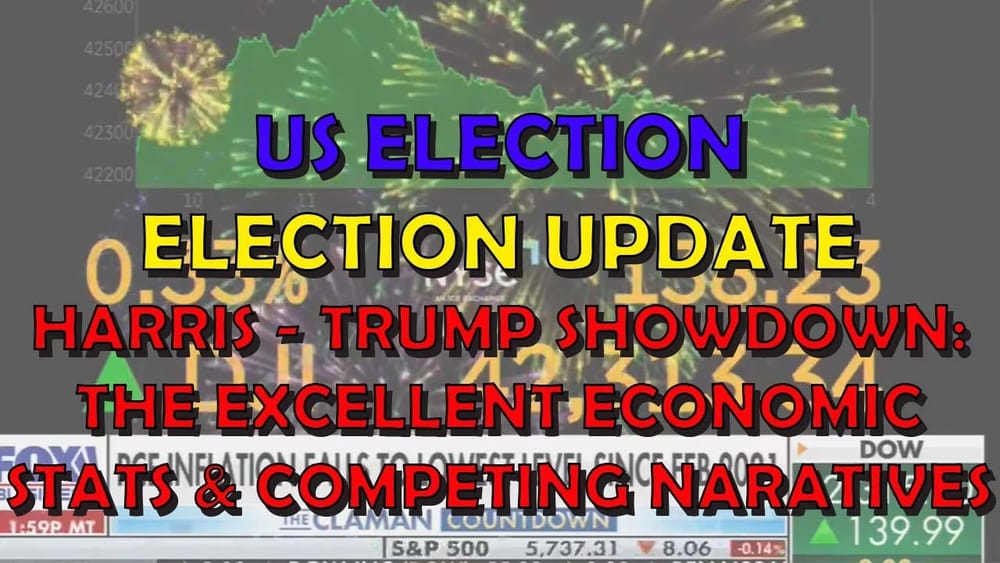US Politics Election Extra: The Excellent Economic Figures & Differing Narratives
Table of Contents 📖
"I literally, I've just got, I've got shivers. I've got goosebumps there, probably not in a good way. That is how accurate George Orwell was in 1984."
Hello Team
🎦 00:00-00:40⏩
Jonathan introduces this US Election special as a deep dive into the US Economy and how perceptions may or may not affect the upcoming election. He acknowledges that he has so much content to get through that he may need to split it into several videos.
Return to top⤴️
The US Economy
🎦 00:40-02:43⏩
Jonathan kicks off by highlighting that a strong economy is usually a good indicator of re-election for an incumbent government. He finds it fascinating that the US economy is performing well across all metrics - inflation is at a manageable 3%, unemployment is low, and the stock market is at a record high. However, he points out that, despite this, Republicans, particularly Donald Trump, continue to hold an advantage in the public perception of economic competence. He questions this perception, citing historical data that suggests Democrats tend to leave the economy in a better state than they inherited, while the opposite is true for Republicans. He acknowledges that this perception exists in other countries as well, citing the UK as an example with the Conservatives and Labour party.
Return to top⤴️
The impact of COVID on perceptions
🎦 02:43-05:09⏩
Jonathan discusses a 538 interview with two experts on inflation. Their research indicates that COVID-19 continues to have a lingering impact on public perceptions of the economy, with many Americans still expecting prices to decrease to pre-pandemic levels. He explains that prices rarely decline significantly, meaning this expectation is unrealistic. This disconnect between perception and economic fundamentals is a key theme Jonathan will explore throughout the video.
Return to top⤴️
How partisanship impacts perception of the economy
🎦 05:09-08:06⏩
Jonathan analyses how partisanship further complicates the relationship between perception and reality in US politics. He explains how political affiliation can heavily influence an individual's view of the economy. For example, a Republican watching Fox News might be more likely to have a negative perception of the economy under a Democratic administration, even if the data suggests otherwise. This is due to the partisan lens through which they receive information.
Return to top⤴️
Fox News and its influence over Republican voters
🎦 08:06-11:13⏩
Jonathan delves into what he believes is a significant factor driving the partisan divide in economic perceptions: the influence of Fox News on Republican voters. He criticises Fox News for not showing a balanced perspective, citing examples like the network's omission of Republican speakers at the Democratic National Convention (DNC) and its downplaying of positive economic news under the Biden administration.
Return to top⤴️
Robert Reich analyses the September jobs report
🎦 11:13-14:17⏩
Jonathan highlights commentary from Robert Reich, former Secretary of Labor under the Clinton administration, regarding the September jobs report. Reich argues that the report is incredibly positive - 264,000 jobs were added, exceeding expectations and past months' figures were revised upward, wages are increasing and inflation is decreasing. Jonathan stresses the significance of this trend: wage growth outpacing inflation for 15 consecutive months, indicating a real improvement in purchasing power for many Americans.
Return to top⤴️
More examples of Fox News downplaying positive economic news
🎦 14:17-18:53⏩
Jonathan continues his critique of Fox News by showcasing several clips where Fox News anchors and guests downplay positive economic data, often pivoting to unrelated negative talking points like immigration and crime. Jonathan emphasises how this deliberate framing seeks to undermine the positive economic narrative and reinforce pre-existing negative perceptions among Republican viewers.
Return to top⤴️
Marco Rubio dismisses the jobs report as "fake news"
🎦 18:53-22:05⏩
Jonathan reacts to a tweet by Marco Rubio labelling a positive jobs report as "fake news" from the Biden administration. Jonathan sees this as a concerning example of the Orwellian rejection of objective reality in pursuit of partisan agendas, likening it to the manipulation tactics depicted in George Orwell's dystopian novel "1984". He expresses concern about the implications of such rhetoric for the future of political discourse and the potential erosion of trust in objective information.
Return to top⤴️
Analysis of US Budget Deficits
🎦 22:05-26:58⏩
Jonathan examines a graph depicting US budget deficits as a percentage of GDP under different presidents. He challenges the notion of Republicans being better economic managers by pointing out that deficits have historically risen under Republican administrations (Bush and Trump) and fallen or stabilised under Democratic administrations (Clinton and Obama). Jonathan acknowledges that economic crises, like the 2008 financial crisis and the COVID-19 pandemic, play a significant role in these fluctuations, but he argues that the data still challenges the simplistic narrative of Republican economic superiority.
Return to top⤴️
Mark Cuban's take on the US Economy under Trump
🎦 26:58-29:36⏩
Jonathan introduces insights from billionaire entrepreneur and "Shark Tank" investor Mark Cuban, highlighting Cuban's criticisms of Trump's economic policies. Cuban argues that Trump's intervention in the oil market, specifically his pressuring of Saudi Arabia and Russia to cut oil production, actually contributed to rising gas prices. Jonathan points out the irony in this, given Trump's frequent rhetoric about increasing drilling to lower gas prices.
Return to top⤴️
Mark Cuban on Theo Von's show
🎦 29:36-32:30⏩
Jonathan finds it significant that Cuban chose to appear on Theo Von's show, given Von's association with the "manosphere", a demographic that largely supports Trump. This suggests a strategic move by Democrats to reach out to this demographic and challenge their perceptions.
Return to top⤴️
Kamala Harris and Tim Walz release tax returns, Trump does not
🎦 32:30-33:46⏩
Jonathan notes that Kamala Harris and Tim Walz have released their tax returns, while Trump and J.D. Vance have not. Jonathan sees this as a continuation of Trump's pattern of financial opacity and suggests it raises further suspicions about Trump's financial dealings.
Return to top⤴️
Millionaires back Harris over Trump
🎦 33:46-37:31⏩
Contrary to the popular narrative of Republicans being the party of the wealthy, Jonathan highlights a poll showing that American millionaires favour Harris over Trump. He argues that this challenges the perception of Republicans as more economically competent, as even affluent individuals seem to have more faith in Harris's economic vision.
Return to top⤴️
US Defence Spending is down under Biden
🎦 37:31-39:45⏩
Jonathan discusses a chart showing that US defence spending as a percentage of GDP is lower under Biden than under previous presidents, including Trump, Obama, and both Bush administrations. He attributes this to the lack of major US military interventions under Biden. Jonathan also argues that providing military aid to Ukraine is a more cost-effective strategy than direct military involvement.
Return to top⤴️
Wrap up
🎦 39:45-40:37⏩
Jonathan concludes his analysis by reiterating that the US economy is performing well under the Biden administration, citing positive indicators across various sectors. He questions why the perception of the economy among many, especially those influenced by partisan media outlets like Fox News, doesn't align with the positive reality.
Return to top⤴️




